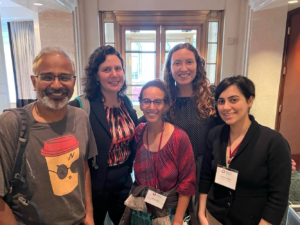The Community Driven Approaches to Research in Technology & Society visioning workshop was held in the Spring of 2023, bringing together a diverse group of 53 civil society representatives, activists, non-profit leaders, and computing researchers together. The workshop was sponsored by CCC and the MacArthur Foundation.

The workshop organizers, Timnit Gebru (Distributed Artificial Intelligence Research Institute), Ufuk Topcu (University of Texas at Austin), and Suresh Venkatasubramanian (Brown University), along with support from Haley Griffin (CCC), Nasim Sonboli (Brown University), and Leah Namisa Rosenbloom (Brown University), have written a workshop report that synthesizes the amazing ideas discussed throughout the visioning workshop. This report is a result of the ideas, experiences, recommendations, and visions of the incredible group of workshop participants.
The Community Driven Approaches to Research in Technology & Society visioning workshop report raises concerns voiced by workshop participants, identifies community-based research directions, provides models for effective collaborations with communities, and provides both broad recommendations and recommendations for specific audiences: funding agencies, academic institutions, and individual researchers.
Workshop participants provided clear advice on how researchers can have meaningful and respectful interactions with community partners. These include the following:
- Do not expect free labor
- Make sure there is value alignment between stakeholders
- Prioritize project leadership by community members
- Do not treat any group like a monolith
- Establish common language
- Establish transparency of project goals and expectations
- Have recourse for harm if community collaborators could face any
- Listen first
- Understand that you are an outsider
- Follow up with the community after your research is complete–give them access to your research
- Act respectfully and ethically (research how to conduct yourself)
- Ask for consent early and often
- Ensure confidentiality of those you work with
They also identified several research directions for community-based research:
- Mapping Projects. This could be in the form of players and ecosystems (i.e. government agencies and communities) and/or harm landscapes (i.e. identifying harms in a specific context and conducting research on the extent of the harms).
- Counter-Programming. For instance, building tools to “surveil the surveillers”, finding ways to protect community interests online, and providing effective measurements to aid advocacy work.
- Tools for Empowerment. It is very important for the community to have a structured design process that empowers people to dream of positive technology futures.
Throughout all workshop discussions, there were two recurring themes that everyone involved in funding and conducting community-based work should follow: community partners should be in leadership positions across the life cycle of the research project, and funds need to be allocated directly to community-based collaborators.
Read the full workshop report here.









